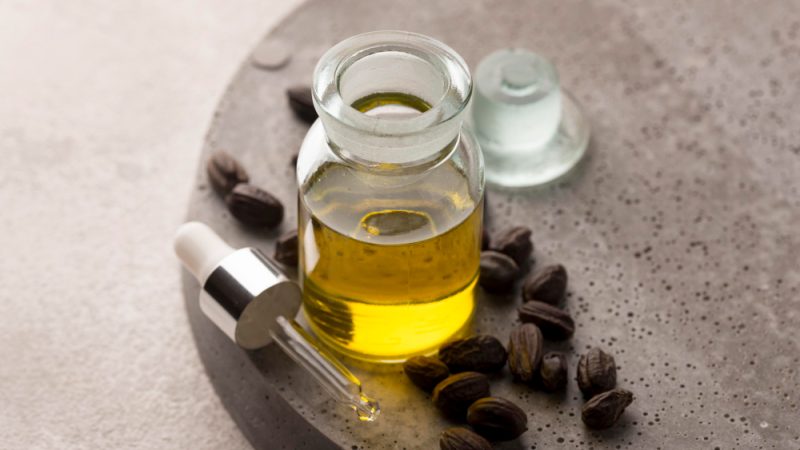When it comes to intimate wellness, many people prefer natural and chemical-free solutions. One product that often comes up in conversations about natural lubricants is castor oil. Known for its thick texture and moisturizing properties, it may seem like a good fit for lubrication — but is it really safe to use on sensitive areas?
In this article, we’ll explore the benefits and risks of using castor oil as lube, explain why it may not always be the best choice, and suggest safer alternatives recommended by experts.
What Is Castor Oil?
Castor oil is a vegetable oil extracted from the seeds of the Ricinus communis plant, commonly known as the castor bean. It’s rich in ricinoleic acid, a fatty acid that gives it its signature thickness and moisturizing properties.
Historically, castor oil has been used in skincare, haircare, and medicinal applications due to its antibacterial and anti-inflammatory effects. It’s also a natural emollient, helping soften and hydrate dry skin.
However, what works well for skin or hair doesn’t always make it safe for intimate areas.
Why People Consider Castor Oil as Lube
The idea of using castor oil as a personal lubricant usually stems from its natural origin and hydrating qualities. People are drawn to it because:
- It’s plant-based and free from synthetic additives.
- It’s long-lasting and doesn’t dry out quickly.
- It provides a thick, cushiony texture that may reduce friction.
For those looking to avoid chemical or water-based products that dry out fast, castor oil can seem like an appealing, natural option.
However, not all oils are created equal — and what feels smooth on the skin can have hidden risks when used internally.
The Potential Benefits of Castor Oil as Lube
Although not officially recommended for internal use, some users report perceived benefits when using castor oil externally in intimate contexts:
- Moisturizing effect: Castor oil deeply hydrates the skin and may soothe dryness.
- Natural ingredients: It doesn’t contain parabens, glycerin, or artificial fragrances often found in commercial lubricants.
- Long-lasting glide: The thick texture can last longer than water-based lubes, reducing the need for frequent reapplication.
- Anti-inflammatory properties: The ricinoleic acid may help calm irritation when used externally.
Despite these apparent benefits, it’s crucial to note that there’s little to no clinical research supporting castor oil’s safety or effectiveness as a sexual lubricant.
The Risks of Using Castor Oil as Lube
While natural doesn’t always mean safe, this is particularly true for castor oil when used as lube. Here are the main concerns:
a. Risk of Infection
Castor oil is not sterile, meaning it can introduce bacteria or fungi into the vaginal or anal area. This increases the risk of yeast infections, bacterial vaginosis, or irritation.
b. Condom Compatibility
Like most oils, castor oil can degrade latex and polyisoprene condoms, making them more likely to tear. This increases the risk of STIs and unwanted pregnancy.
c. Irritation and Allergic Reactions
The genital area is highly sensitive. Castor oil’s thick consistency and strong chemical compounds can cause burning, redness, or itching in some people, especially if applied internally.
d. Disrupting Vaginal pH
Using castor oil can alter the natural pH balance of the vagina, which may lead to infections and discomfort over time.
e. Difficult Cleanup
Castor oil is very sticky and doesn’t wash off easily with water. It can stain fabrics and linger on the skin, trapping bacteria and increasing irritation risks.
Is Castor Oil Safe for Vaginal Use?
Most gynecologists do not recommend using castor oil as a vaginal lubricant. While it’s safe for external skin applications, the internal vaginal environment is delicate and self-regulating.
Using heavy oils like castor oil can trap bacteria and interfere with the natural cleansing process, leading to odors, infections, or inflammation.
If you’re seeking a natural moisturizer for the vulva (external area only), cold-pressed and hexane-free castor oil can be used sparingly, but it should never be applied inside the vagina.
Castor Oil vs. Other Natural Oils
Many people who explore natural lubricants compare castor oil to others like coconut oil, olive oil, or almond oil.
Here’s how they differ:
| Oil Type | Texture | Condom Safe | Common Use | Notes |
| Castor Oil | Very thick | ❌ No | Skin, hair | Not safe for internal use |
| Coconut Oil | Medium-thick | ❌ No | Skin, external lube | Can cause yeast infections in some |
| Olive Oil | Medium | ❌ No | Massage oil | May alter pH balance |
| Aloe Vera Gel | Light, water-based | ✅ Yes | Vaginal lube | Safe and soothing |
| Vitamin E Oil | Thick | ❌ No | Moisturizer | Use externally only |
As you can see, water-based or aloe-based lubes are far safer for internal use than heavy oils like castor oil.
Safer Natural Alternatives to Castor Oil
If you’re looking for natural lubricants that are body-safe, here are some better options:
a. Aloe Vera Gel
Pure, organic aloe vera gel is water-based and pH-balanced, making it safe for vaginal and anal use. It provides moisture and helps soothe irritation.
b. Water-Based Lubes
These are designed specifically for sexual use. They’re condom-safe, non-staining, and available in natural, organic formulas without synthetic chemicals.
c. Silicone-Based Lubes
While not “natural,” silicone-based lubricants are long-lasting, hypoallergenic, and great for people sensitive to other ingredients.
d. Coconut Oil (External Only)
Coconut oil can be used externally for vulvar dryness or massage but should be avoided for internal use or with condoms.
e. Hyaluronic Acid Lubricants
These mimic the body’s natural moisture and are excellent for those with vaginal dryness due to menopause or hormonal changes.
How to Choose the Right Lubricant
When selecting a lubricant, consider these factors:
- Purpose: Is it for vaginal, anal, or toy use?
- Condom Use: Always ensure compatibility with your contraceptive method.
- Ingredients: Avoid glycerin, parabens, or synthetic fragrances that can cause irritation.
- pH Balance: Especially for vaginal use, choose products designed to match natural pH levels.
- Medical Conditions: Consult your doctor if you have chronic infections or sensitivities.
What Experts Say
According to gynecologists and sexual health experts, using oils like castor oil, olive oil, or baby oil for lubrication is not recommended.
Dr. Jen Gunter, a renowned gynecologist, notes that oils can trap bacteria and damage the vaginal ecosystem. She emphasizes using products specifically formulated for intimate areas to maintain vaginal health.
Dermatologists also warn that thick oils can clog pores and cause irritation in sensitive skin folds.
Final Thoughts: Should You Use Castor Oil as Lube?
While castor oil has excellent moisturizing properties for skin and hair, it’s not suitable as a sexual lubricant. Its thickness, potential to disrupt vaginal pH, and incompatibility with condoms make it a risky choice.
If you’re looking for something natural, opt for aloe vera, water-based, or silicone-based lubes made specifically for intimate use. These options provide moisture, safety, and comfort without compromising your sexual health.
Conclusion
Castor oil may seem like an appealing, natural alternative for lubrication, but it carries significant risks for intimate use. Its heavy texture and non-sterile composition can lead to infections, irritation, and reduced condom safety.
Instead, invest in body-safe lubricants designed for sexual health, such as water-based or aloe-based options. Always read ingredient labels, consider your sensitivities, and consult a healthcare professional if you experience any discomfort.
Your intimate health deserves safe, effective care — not improvised solutions that could do more harm than good.
FAQs
1. Can I use castor oil as lube in an emergency?
It’s best not to. Even for one-time use, castor oil can irritate sensitive tissues and damage condoms. Water-based lubricants are much safer alternatives.
2. Is castor oil safe for external genital use?
Yes, it can be applied sparingly on external skin for dryness, but avoid internal contact to prevent infections.
3. Can castor oil cause yeast infections?
Yes. Oils can trap moisture and disrupt the natural vaginal flora, creating an environment where yeast can thrive.
4. What natural lubricants are safe for vaginal use?
Pure aloe vera gel, water-based, and hyaluronic acid-based lubricants are safe and effective options.
5. Does castor oil have any benefits for intimate skin care?
It may moisturize external skin and reduce dryness, but it should not replace personal lubricants meant for internal use.
Also read: Reddish Orange Hair Dye: Bold, Fiery Shades to Try in 2025









